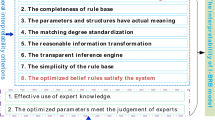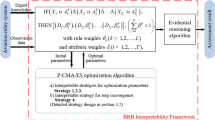Abstract
Health-state assessment is the foundation of optimal-maintenance decision-making for complex systems to maintain reliability and safety. Generating the assessment results in a convincing and interpretable way to avoid potential risks is of great importance. Belief rule base (BRB) as an interpretable model performs well in health-state assessment. However, the interpretability of a BRB-based model may be lost during the optimization process, which is expressed mainly as three problems: expert knowledge is not effectively used in the optimization process; the optimized rules of BRB may be in conflict with real systems; and some parameters get over-optimized, which may affect experts’ initial judgment. Three concepts — “searching intensity”, “interpretability constraint of belief distribution”, and “rule-activation factor” — are defined to address these problems. Using these concepts, we propose a new health-state assessment model based on the interpretable BRB and a new optimization method to improve the accuracy and preserve the interpretability of the new model. To demonstrate the effectiveness of the proposed model, we conducted an aero-engine case study.
Similar content being viewed by others
References
Zhao F J, Zhou Z J, Hu C H, et al. A new evidential reasoning-based method for online safety assessment of complex systems. IEEE Trans Syst Man Cybern Syst, 2018, 48: 954–966
Narmada S, Jacob M. Reliability analysis of a complex system with a deteriorating standby unit under common-cause failure and critical human error. Microelectron Reliab, 1996, 36: 1287–1290
Dao C D, Zuo M J. Optimal selective maintenance for multi-state systems in variable loading conditions. Reliab Eng Syst Saf, 2017, 166: 171–180
Yin X J, Wang Z L, Zhang B C, et al. A double layer BRB model for health prognostics in complex electromechanical system. IEEE Access, 2017, 5: 23833–23847
Chen Y W, Yang J B, Xu D L, et al. On the inference and approximation properties of belief rule based systems. Inf Sci, 2013, 234: 121–135
Hinton G E. Reducing the dimensionality of data with neural networks. Science, 2006, 313: 504–507
Mulder Y D, Wyseur B, Preneel B. Cryptanalysis of a perturbated white-box AES implementation. In: Proceedings of International Conference on Cryptology in India, 2010. 292–310
Yang J B, Liu J, Wang J, et al. Belief rule-base inference methodology using the evidential reasoning approach-RIMER. IEEE Trans Syst Man Cybern A, 2006, 36: 266–285
Zhou Z J, Hu G Y, Hu C H, et al. A survey of belief rule-base expert system. IEEE Trans Syst Man Cybern Syst, 2019. doi: https://doi.org/10.1109/TSMC.2019.2944893
Zhou Z J, Hu C H, Yang J B, et al. Online updating belief rule based system for pipeline leak detection under expert intervention. Expert Syst Appl, 2009, 36: 7700–7709
Chang L L, Dong W, Yang J B, et al. Hybrid belief rule base for regional railway safety assessment with data and knowledge under uncertainty. Inf Sci, 2020, 518: 376–395
Cheng C, Qiao X Y, Teng W X, et al. Principal component analysis and belief-rule-base aided health monitoring method for running gears of high-speed train. Sci China Inf Sci, 2020, 63: 199202
Zhou Z J, Feng Z C, Hu C H, et al. A hidden fault prediction model based on the belief rule base with power set and considering attribute reliability. Sci China Inf Sci, 2019, 62: 202202
Yang J B, Liu J, Xu D L, et al. Optimization models for training belief-rule-based systems. IEEE Trans Syst Man Cybern A, 2007, 37: 569–585
Chen Y W, Yang J B, Xu D L, et al. Inference analysis and adaptive training for belief rule based systems. Expert Syst Appl, 2011, 38: 12845–12860
Chang L L, Zhou Y, Jiang J, et al. Structure learning for belief rule base expert system: a comparative study. Knowledge-Based Syst, 2013, 39: 159–172
Chang L L, Zhou Z J, Chen Y W, et al. Belief rule base structure and parameter joint optimization under disjunctive assumption for nonlinear complex system modeling. IEEE Trans Syst Man Cybern Syst, 2018, 48: 1542–1554
Zhou Z J, Hu C H, Yang J B, et al. Online updating belief-rule-base using the RIMER approach. IEEE Trans Syst Man Cybern A, 2011, 41: 1225–1243
Zhou Z J, Hu C H, Yang J B, et al. A sequential learning algorithm for online constructing belief-rule-based systems. Expert Syst Appl, 2010, 37: 1790–1799
Li G L, Zhou Z J, Hu C H, et al. A new safety assessment model for complex system based on the conditional generalized minimum variance and the belief rule base. Saf Sci, 2017, 93: 108–120
Casillas J, Cordón O, Herrera F, et al. Accuracy Improvements in Linguistic Fuzzy Modeling. Berlin: Springer, 2013
Zadeh L A. A fuzzy-set-theoretic interpretation of linguistic hedges. J Cybernetics, 1972, 2: 4–34
Zhou S M, Gan J Q. Low-level interpretability and high-level interpretability: a unified view of data-driven interpretable fuzzy system modelling. Fuzzy Sets Syst, 2008, 159: 3091–3131
Wu W K, Yang L H, Fu Y G, et al. Parameter training approach for belief rule base using the accelerating of gradient algorithm. J Front Comput Sci Technol, 2009, 22: 5166–5170
Li G L, Zhou Z J, Hu C H, et al. An optimal safety assessment model for complex systems considering correlation and redundancy. Int J Approx Reason, 2019, 104: 38–56
Chang L L, Zhou Z J, Liao H, et al. Generic disjunctive belief-rule-base modeling, inferencing, and optimization. IEEE Trans Fuzzy Syst, 2019, 27: 1866–1880
Acknowledgements
This work was supported in part by National Natural Science Foundation of China (Grant Nos. 61773388, 61702142, 61751304, 61833016, 61867001), China Postdoctoral Science Foundation (Grant Nos. 2015M570847, 2016T90938), Key Research and Development Plan of Hainan (Grant No. ZDYF2019007), Natural Science Foundation of Hainan (Grant No. 2019CXTD405), and Guangxi Key Laboratory of Trusted Software (Grant No. KX202050).
Author information
Authors and Affiliations
Corresponding author
Rights and permissions
About this article
Cite this article
Zhou, Z., Cao, Y., Hu, G. et al. New health-state assessment model based on belief rule base with interpretability. Sci. China Inf. Sci. 64, 172214 (2021). https://doi.org/10.1007/s11432-020-3001-7
Received:
Revised:
Accepted:
Published:
DOI: https://doi.org/10.1007/s11432-020-3001-7




